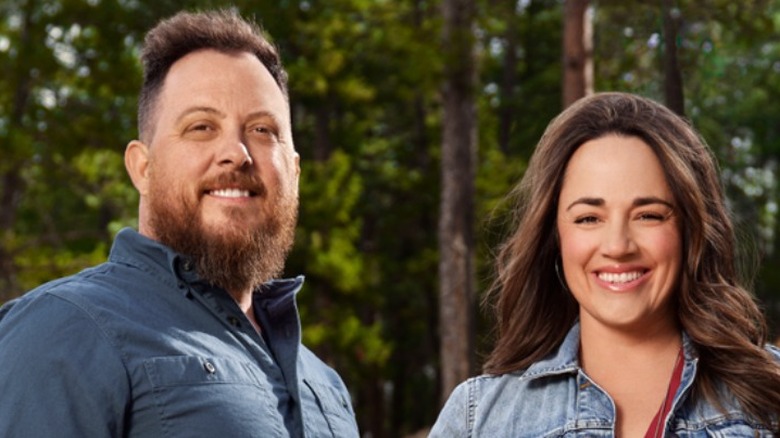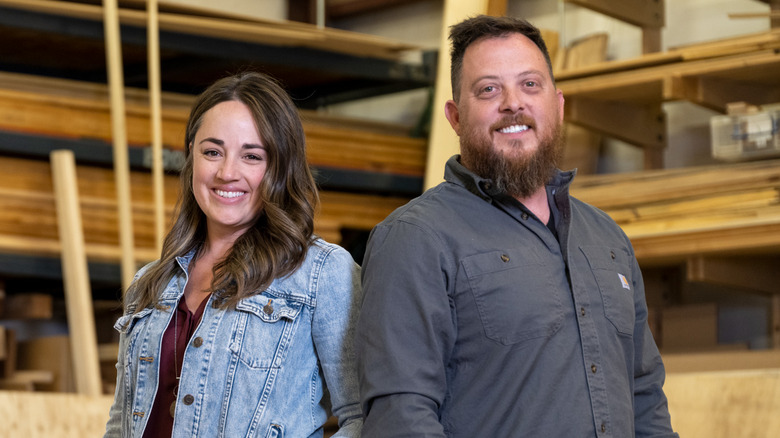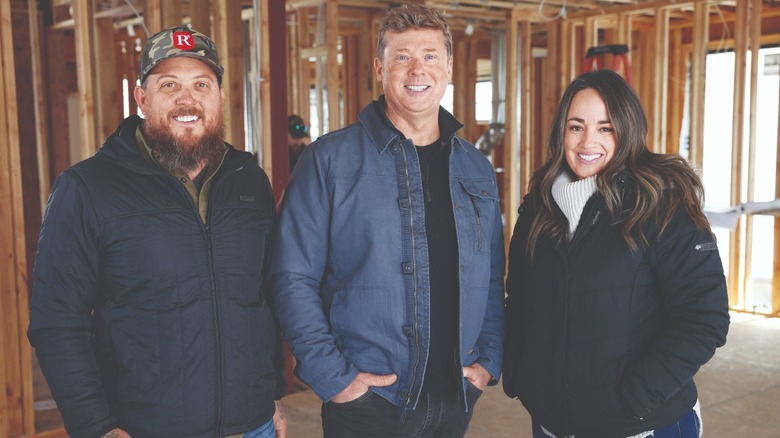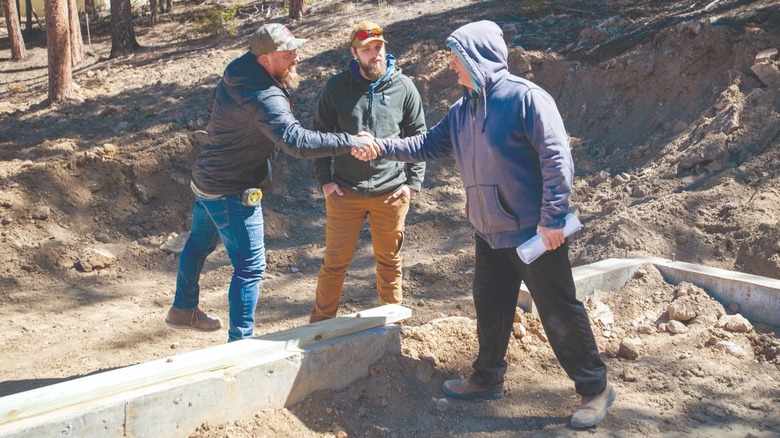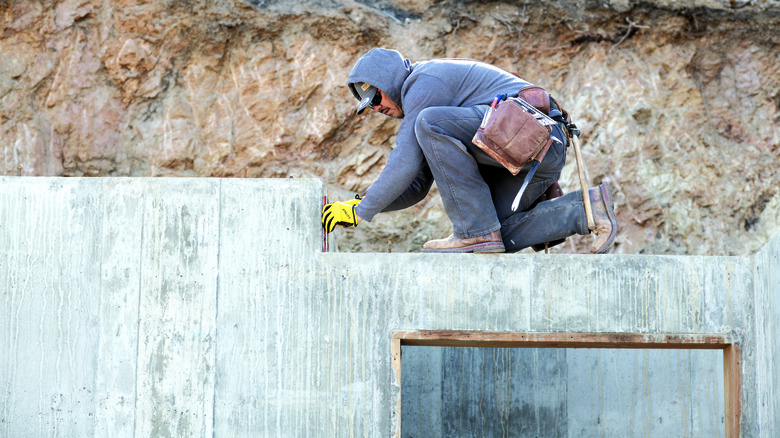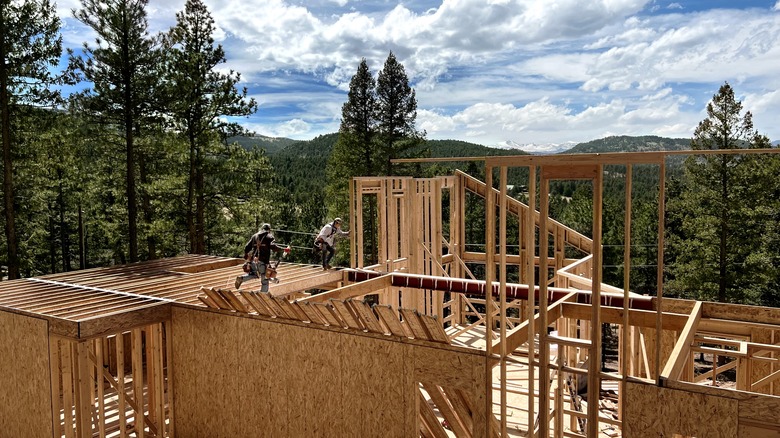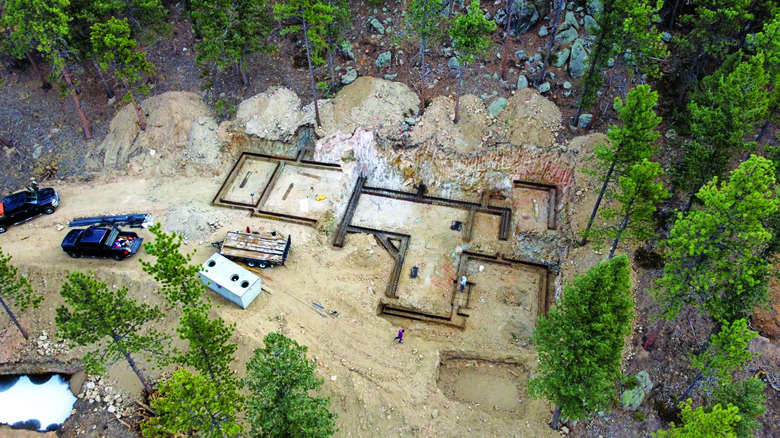Jared & Amber Phifer Talk Their New Home Design Show - Exclusive Interview
Everyone loves a good home improvement or design show. It can be incredibly satisfying to see an empty lot transform into a fully constructed home under the direction of experts in the field. However, that process isn't nearly as easy as it's been made to look in a lot of popular television programs, especially when you factor in variables like climate, weather, clients, and more.
Those hidden struggles and realities are exactly what Jared and Amber Phifer aim to expose on their new show "Idea House: Mountain Modern," which is streamable on The Roku Channel. The Denver-based husband and wife duo have extensive experience in the home design and build world, having been the owners of Revolve Design-Build for nearly 17 years.
The series, brought to The Roku Channel by the creators of "This Old House," explores the process of building a luxurious and modern home in the Rocky Mountains — one of Colorado's harshest climates — from conception to execution. In an exclusive interview with House Digest, Jared and Amber talk about how it feels to have the entire process filmed and televised, some common design-build misconceptions, industry secrets, and more.
The reality of filming a home design show
Starting off, can you introduce yourselves, the show, and Revolve Design-Build?
Amber Phifer: Yeah, I'm Amber. We're excited about the opportunity. This has been big for us and our company, and we're excited to share our knowledge and our experience. [We're hoping] that people can participate with us in the learning process of what it's like to design and build homes, and all the many parts and pieces that it takes to do it, and the flexibility that you have to have. Do you want to say anything?
Jared Phifer: Yeah, Jared, owner of Revolve. I like building stuff, and I also appreciate design. I have a creative background, so I also enjoy being part of the design experience in building.
How did it feel to move from traditional, private work with your team and clients to having the entire process be filmed? Was it more vulnerable, and did you feel like there was more pressure?
Jared: It's been really interesting to get used to, I don't know what to call it, Hollywood. Everything's blown out of proportion, and –
Amber: Yeah, larger-than-life feeling.
Jared: We were basically trying to create an issue, in a way. And so on film, [things were] translated as, "This is a change they want to make while we're pouring footers," but that's not what really happened behind the scenes. So that's been weird to get used to. I actually had a little bit of pushback when we first got started. I was like, "I'm a builder and I'm excited to do a TV show, but I'm not an actor. I didn't train to be an actor." So after we had some of those conversations, I've been feeling better, being heard by the team and production team. And the clients are super patient. And you just start to get a grip on things. You're like, "Oh, cool. We're going to do this three times." You start to acclimate. So it's been very different. And we are never opposed to learning something new.
Amber: Yeah. And I think that the both of us could relate to each other — that we're trying to figure it out in the moment — because obviously our process has never been publicized. It's really only relevant to the people involved in the project. Now that we're charged with sharing with the country, essentially, it's really causing us to have to think through the method behind what we do and why we do it — and then holding true to that, even if there's pressure outside of the project. The added pressure of a television show or publicity, it's really causing us to dig in deep to our roots of who we are as people. That challenge of, "is our integrity as important to us as we say it is?" And so how do we continue to maintain that integrity, even through the storytelling and the different opinions on what should be highlighted, etc.?
Starring in a home design show for the first time
Was starring in a home improvement show ever a goal or something you two had in mind when starting Revolve Design-Build?
Jared: I used to kid about it.
Amber: Yeah. Jared would always joke. We have [had] such interesting characters that worked for Revolve over the years.
Jared: Yeah, just some of the stories over the years, you're like, "Man. This could make good TV." So yeah, it was a thought.
Amber: But I don't know if it was ever actually a serious thought. It was just all in fun — laughing about ourselves, that we would be ridiculous to the observing eye.
Jared: I want to say High Noon Productions came to us at one point just said, "Hey, are you doing anything interesting? Maybe we could do a TV show." So we did an interview. It was the first time I was like, "Maybe there could be a TV show." And then I was like, "I don't want to be a part of this make-believe or drama." Most of the stuff I watch on HGTV, I'm just like, "You can't build a kitchen for $20,000 anymore. This is a lie. Stop lying to people." Because now people in the real world have to tell them why their kitchen's $100,000, and so it –
Amber: It actually puts an expectation on builders because of the drama that's created.
Jared: Yeah, like "Why can't you do this in a week like they did on TV?" And it's like, "It didn't take a week. There's no way." So there was a part of me and I was like, "No, I don't want to do that," so I didn't pursue that. And then there's another show that reached out to me to do sacred rooms, like sex rooms. And I was like, "No. I think I'm good. I don't know if I want to be known as that guy." We could guest star on it, maybe once.
Amber: What?
Jared: No, I'm just kidding. Then "This Old House" reached out to us. I was just like, "Whoa."
Amber: It made sense, actually.
Jared: I watched "This Old House" growing up as a kid. And I always liked how it wasn't all the fluff. It was realistic expectations, and it was really elevating the trades. These guys know what they're doing.
Amber: It's highlighting what we do.
Advice for new homeowners and designers
How has the popularity of home improvement shows and social media changed your line of work?
Amber: That's a really in-depth question. As a designer, I notice a lot of influence over the narrative that is being written into home improvement shows in general. This DIY, save some cost, do it yourself, participatory idea that I think people have in their home building, which does seem beneficial, in some senses. But I think when it comes to design, especially in the complexity of a new home and all the parts and pieces that go into that, I think one of the hardest contributing factors is when clients actually pretend to be the designer and they really complicate the process. That's a challenge I see that I attribute to the narrative that TV is giving designing and building.
Jared: It speaks to people, too. I mean, everyone needs a house. I think it really speaks to people where they're like, "Maybe I could do that." Watching someone else do something is inspiring. And so I think that's probably why there's a lot of shows out there like that. And that's probably why there's not any shows on the medical world doing it yourself.
Amber: DIY surgery.
Jared: Yeah, DIY surgery, let's go. Oh, boy. I think everyone's creative at heart. They want to be creative at something, so doing something with their hands, building something, or coming up with an idea and drawing it, just really speaks to everybody.
Amber: Yeah. I think that's probably what people are drawn to in home building shows or design shows. It's inspiring, especially when it comes to the home. I think people really connect with that because everyone wants a home that they can feel comfortable and inspired in.
What do you want people to take away from this show? Do you want to change the narrative for the new generation of designers, builders, and homeowners?
Jared: We need the next generation to actually care to do the trades. I think there's going to be a huge loss of workers in the trades. It's been dwindling as you can make more money in pretty much any other industry. It's really challenging, but it's a lot of fun. It's rewarding. And you sleep really good at night.
Amber: Because you're so exhausted.
Jared: I would just say to the next generation, it's fun. It's worth it. Being a part of something where you actually care about what you do means more in the long-run than just chasing money.
Amber: There's some satisfaction to building houses that I guess people who've never given it a try wouldn't know, that feeling of accomplishment. But I would want people who are maybe interested in designing and building homes to know that there's joy and satisfaction in achieving a goal with a whole bunch of people involved. [After] all that it takes to work that all out, to stand back and say at the end, "Wow, that took a lot of effort. And this didn't exist before, and now it's here, and now it's someone's home for the next 100 years." I think you're leaving behind a legacy, and it's not just, "Let's just get through it and get it done and move on." You're actually leaving part of your creativity behind.
The challenges of working in the mountains
How important is the mountain part of mountain modern? Is incorporating nature important to you two when conceptualizing a home?
Jared: It's everything, for me personally. I think every home should blend in with its environment. And it should actually just showcase where it is more than showcase itself. That's why I like checking out the lots and seeing where homes are going to be and what [they're] showcasing in nature. Obviously that's where we draw all of our, what's the word I'm looking for?
Amber: Inspiration.
Jared: Inspiration. So that's what I would say is important to me. If you're building a house in the city and there's all sorts of styles around it, then let it be fun and eclectic and blend into that environment. Our personal favorite is mountain modern just because we love being in the mountains, and showcasing that.
What unique challenges and opportunities does the mountain climate present to you?
Amber: Well, I think when you're designing a house in the middle of the mountains, your goal is to be able to sit in your house and observe the beauty of the remoteness, the beauty of the uninterrupted tree line, and the beauty of the peaks and the snow. But it's a double-edged sword, because the snow is what really causes so much disruption to the process of building. But just having your sight set on, "This will be enjoyable after it's built" — and even though it does present challenges — it's worth it for what you gain to be able to live there and see it for the beauty that it is.
Jared: Yeah. Living in the mountains can be challenging. We haven't lived in the mountains. We want to. But what I've heard from people that do is you'll know if you want to live in the mountains in the first two years. It's not for everybody. And a lot of that's because of the ongoing maintenance of snow removal. There's more that you've got to take care of.
Amber: Yeah, like you have to be aware of your trash, and bears, and the wildlife. You can't have a garden without having a fence. And you have to keep your trash locked up. And there's measures that you have to take.
Jared: Yeah, there's a lot more to consider for the homeowner. Building there, the window of time is smaller, the build season. The higher in elevation you get, the build season really shrinks. We have a home that's being built at, is it 8,000 feet? It's climate zone seven. And so spring doesn't start until May or June there, and then fall starts in September. So it's like you got this little window to really do some critical things. And then the snow, once it starts snowing, it's there until spring is there. So there's no getting out of it. There's still varying degrees in the mountains where it's like climate zone six or seven. It can get more and more challenging. And that's really just because of the limited window that we have.
What it's like to work together as a married couple
What are some home design styles you both dislike?
Amber: Traditional. I don't know. I think we appreciate most styles.
Jared: No, not eclectic.
Amber: He's not eclectic. I really appreciate the eclectic, but anything highly ornate or detailed is not his favorite, that's for sure.
Jared: Yeah. I'm a minimalist.
Amber: I would say, I don't know, I really like the different flares of design. I would say traditional is probably my least favorite, too, in excess — but I think you can adopt a lot of traditional elements. And actually, tradition is in most design, to some degree. And so I think –
Jared: A house is very traditional.
Amber: A house in and of itself, if there [are] walls, it's traditional. So I think that I just have an appreciation for a lot of different styles, personally. And so I think that actually does make me more eclectic in nature.
How does working together as a married couple challenge or motivate you? Does it hinder communication or increase it?
Amber: I guess the perks of working together as a married couple [are] that we have an understanding of what kind of pressures we're both under. I think that in turn gives us some empathy for each other and understanding. When a day just goes wrong and you get home at 8:00 and you're beat down. It's like, "Enough said. I get it. I understand."
Jared: Yeah.
Amber: When I first started working with Revolve, I think there was some relief of like, "Oh, yeah. Now you see into my day, into a life in the day of Jared Phifer a little bit more closely." I think it's challenging when we're both busy with the same stress; we don't want to talk about the stress because we know that it increases stress. We can't process it the same way all the time, like you would with your spouse when you have different worlds, because it's just a little too close. And so we often have to just say, "I don't have the capacity to talk about this. We have to do something completely different." And then it just postpones, if you need to process out loud.
Jared: Yeah, or we'd call a friend. Vent to a friend.
Amber: Yeah. But we're not often on projects together. Usually we're working on different ones. And so we're in the office at the same time maybe a quarter of the week. And so it's actually enjoyable because we're –
Jared: We're doing our own thing, but we get to share and see each other's world. It's a lot of fun.
Stories from set
Were there any funny, shocking, or memorable moments or stories that you want to share from your filming experience?
Jared: The whole experience is just funny, just being miked all the time. Yeah, you go to the bathroom and you're like, "Is someone listening to me right now?" I don't know. It's just like everything goes out the window. It's like, "Oh, okay." That's been funny and weird at the same time.
Amber: Funny and weird. I don't know, taking our kids on site was really fun. They were really cute. We got to film with them a month ago or so. And it was surprising how easily adapted they were to it, but also scary that it was so easy. It was like, "This should not be easy for you. Don't get too used to this."
Jared: They're naturals.
Amber: It's just not something that we thought we would get used to, having cameras and microphones on us capturing things. But it's hard when you're having a really stressful day and you have to film. I think some of the days that have stood out more to me are when I can feel my cheeks getting hot, because my cheeks get really red when I get flustered, and so it's like, "Great. Now, is that being picked up on by America?" Maybe just my parents and brothers will notice, but they're like, "You were mad during that scene, huh?"
"Idea House: Mountain Modern" is now available to stream on The Roku Channel (new episodes release on Thursdays).
